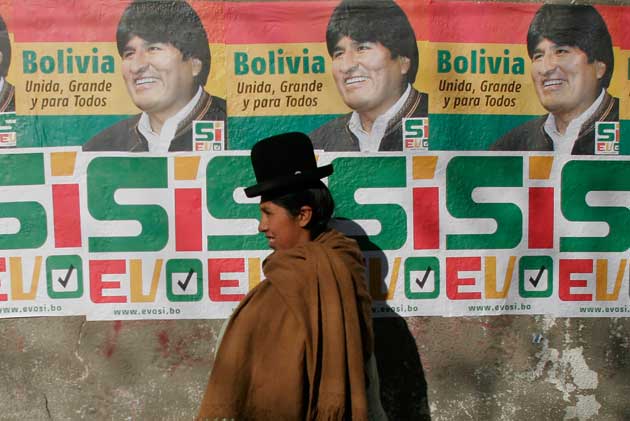Bolivia's President puts his popularity to the test
Morales gambles on election to oust opposition leaders

After today's Bolivian referendum, Evo Morales will know whether he will be staying on in the presidential palace or contemplating a return to growing coca – "for medicinal purposes, not for cocaine".
The 48-year-old President, known for visiting world leaders in a woolly jumper and wearing well-worn tennis shoes at public events, gambled on a "recall referendum" to assert his popularity and call the bluff of regional governors, who seek autonomy and oppose his land reform and nationalisation policies.
As well as his popularity test, he has insisted on separate referendums in eight of the nine departments in the hope of seeing off some of the governors and giving himself a greater mandate for constitutional change, including the chance to run for a second five-year term.
Even if, as expected, Mr Morales wins his personal vote, the governors say they will not recognise the result and the poorest nation in South America faces further polarisation between the President's indigenous supporters, mainly in the highland west, and the political establishment of European or part-European descent in the wealthier, gas-rich eastern lowlands.
Most of the governors say they will not stand down if they lose their votes, while, on Thursday, Percy Fernandez, the mayor of the opposition-run city of Santa Cruz, went as far as to call for a military coup.
With some shrewd legal manoeuvring, Mr Morales has stacked all of today's polling in his favour. To oust him, the vote would have to be anything above the percentage that brought him to power in 2005 – 53.7 per cent. As his popularity is at an all-time high – 59 per cent, according to latest polls – defeat is unlikely. Under his rules, however, the governors have a tougher task. To retain their posts, they need a simple majority even though most of were voted in with far smaller votes, some as low as 38 per cent.
On the eve of the referendum, Mr Morales could hardly claim to control the whole country, described by one Bolivian political scientist as "in many, many ways a failed state ... we're becoming sort of a collection of city-states". The country's first president of pure Indian extraction was blocked from reaching two provincial cities during last week's campaigning and was forced to hold Independence Day celebrations last Wednesday in the capital, La Paz – his power base – instead of in the "constitutional capital", Sucre, where the opposition to his government is fierce.
Pre-referendum violence has left two tin miners dead and several wounded. Whatever today's results, most political analysts predict further upheaval as the nation's poor but increasingly vocal indigenous peasants face up to the political and business elite.
Mr Morales grew up herding llamas in the Andean plateau before turning to farming coca – legal in Bolivia because of its use in rituals and against altitude sickness – and rising to lead the country's coca farmer's union before the support of Aymara and Quechua Indians propelled him to the presidency in 2005. Six out of 10 Bolivians are indigenous, and it is no coincidence that the ratio of people in poverty is also six out of 10, according to the UN.
Two of Mr Morales's closest allies are Fidel Castro and Hugo Chavez, and one his campaign slogans echoed their anti-US rhetoric: "Long Live Coca, Death to the Yankees!" Another, however, "Coca, si! Cocaine, no!" reflected his view that he supports US efforts to prevent the leaf from being made into the paste which becomes cocaine.
Join our commenting forum
Join thought-provoking conversations, follow other Independent readers and see their replies
Comments